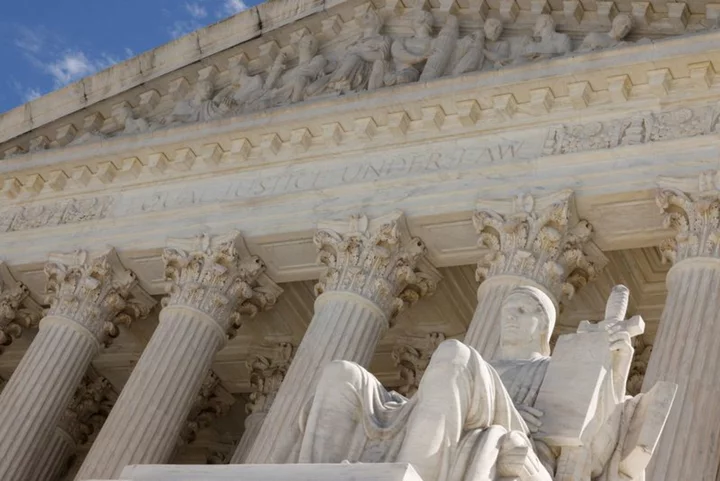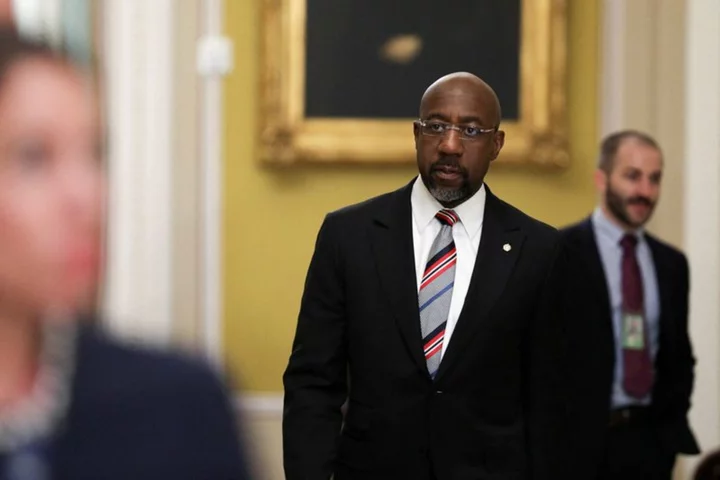The U.S. Supreme Court on Monday opens a new nine-month term loaded with important cases on issues including gun rights, the power of federal agencies, Purdue Pharma's bankruptcy settlement, the legality of Republican-drawn electoral districts and even one involving the size of Donald Trump's hands.
Here is a look at some of the cases the justices are due to decide.
DOMESTIC VIOLENCE GUN CURBS
Another major gun rights dispute is coming to the justices as they are poised to decide whether a 1994 federal law that bars people under domestic violence restraining orders from possessing firearms violates the U.S. Constitution's Second Amendment. President Joe Biden's administration appealed a lower court's ruling that the law ran afoul of the Second Amendment's "right to keep and bear arms" because it fell outside "our nation's historical tradition of firearm regulation." A challenge to the law was filed by a Texas man charged with illegal gun possession while subject to a domestic violence restraining order after assaulting his girlfriend. Arguments are scheduled for Nov. 7.
SOUTH CAROLINA ELECTORAL MAP
The justices are due to hear a bid by South Carolina officials to revive a Republican-crafted voting map that a lower court concluded had unconstitutionally "exiled" 30,000 Black voters from a closely contested U.S. House of Representatives district. South Carolina officials appealed a federal judicial panel's ruling that the map deliberately split up Black neighborhoods in Charleston County in a "stark racial gerrymander" and must be redrawn. Gerrymandering involves the manipulation of electoral district boundaries to marginalize a certain set of voters and increase the influence of others. Arguments are scheduled for Oct. 11.
CONSUMER WATCHDOG AGENCY'S FUNDING
The court is set to decide whether the Consumer Financial Protection Bureau's funding structure established by Congress violates the Constitution in a case that the Biden administration has said threatens the agency's ability to function. The administration appealed a lower court's ruling in a lawsuit by trade groups representing the payday loan industry that found that the funding mechanism violated the constitutional provision giving lawmakers the power of the purse. The agency, which enforces consumer financial laws, draws money each year from the U.S. Federal Reserve rather than budgets passed by Congress. Arguments are scheduled for Oct. 3.
SEC IN-HOUSE ENFORCEMENT
The justices will hear the Biden administration's defense of certain Securities and Exchange Commission in-house enforcement proceedings in another case that could undercut the power of federal agencies. The administration appealed a lower court's decision that struck down certain SEC enforcement proceedings as unconstitutional for violating the right to a jury trial and infringing on presidential and congressional powers. The case involves a hedge fund manager who the SEC had fined and barred from the industry over securities fraud. Arguments have not yet been scheduled.
COMMERCIAL FISHERMEN
The issue of whether the government can require commercial fishermen to help fund a program monitoring herring catches off New England's coast will come before the court in yet another a case that could diminish the power of federal agencies. New Jersey-based fishing companies appealed a lower court's ruling in favor of the U.S. government in a challenge to a conservation program overseen by the National Marine Fisheries Service. The companies are asking the Supreme Court to overturn its decades-old precedent calling for judges to defer to federal agency interpretation of U.S. laws, a doctrine called "Chevron deference." Arguments have not yet been scheduled.
PURDUE PHARMA BANKRUPTCY SETTLEMENT
A Biden administration challenge to the legality of Purdue Pharma's bankruptcy settlement goes to the justices, involving a deal that would shield its wealthy Sackler family owners from lawsuits over their role in the U.S. opioid epidemic. Purdue's owners under the settlement would receive immunity in exchange for paying up to $6 billion to settle thousands of lawsuits filed by states, hospitals, people who had become addicted and others who have sued the company over misleading marketing of its powerful pain medication OxyContin. Arguments have not yet been scheduled.
SOCIAL MEDIA AND GOVERNMENT OFFICIALS
Exploring free speech rights in the social media era, the court will consider whether the Constitution's First Amendment bars government officials from blocking critics on platforms like Facebook and X, formerly called Twitter. At issue in disputes from California and Michigan is whether a public official's social media activity can amount to governmental action bound by First Amendment limits on government regulation of speech. Arguments are scheduled for Oct. 31.
WORKPLACE BIAS
A dispute over whether workers can bring discrimination lawsuits based on unwanted workplace transfers allegedly motivated by bias - an issue that can make or break many cases - will come before the justices. They took up a case involving a St. Louis police officer who is seeking to revive claims that she was transferred to an undesirable post to make way for a male officer. Arguments have not yet been scheduled.
'TRUMP TOO SMALL' TRADEMARK
The court will consider whether a California attorney's trademark for the phrase "Trump Too Small" - a cheeky criticism of the former president - should have been granted by the U.S. Trademark Office. The office appealed a lower court's decision that the attorney's First Amendment free speech protections for his criticism of public figures outweighed the agency's concerns about Trump's rights. He applied for the trademark in 2018 to use on shirts, citing among other things remarks by Senator Marco Rubio about the size of "certain parts of (Trump's) anatomy, such as his hands." Arguments are scheduled for Nov. 1.
(Compiled by Andrew Chung in New York and John Kruzel and Blake Brittain in Washington; Editing by Will Dunham)









